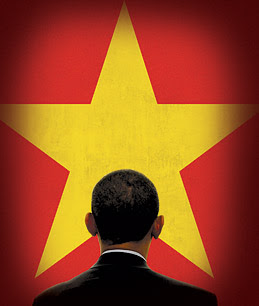Hu's Visit: Finding a Way Forward on U.S.-China Relations
Party officials working on one element of the program, the nighttime fireworks display, had a particular request of the designers. China, they worried, is like many other nations — a place where the line between healthy patriotism and nationalism isn't apparent until you've stepped over it. They fretted that after a day of military adrenaline, a night of explosive percussion might be too much. So they asked, Would it be possible to arrange for a big, beautiful, calming fireworks display? (See pictures of U.S. Presidents in China.)
Calming fireworks. It was the sort of request that tells a great deal about the charm and dangers of life in China. This is a country that runs on contradictions, whether it is the market socialism that now produces record economic growth or the plans for giant green cities, an idea that seems as likely as healthy cheeseburgers. This is a nation where party élites who have done well during the era of reform now complain ever more loudly about the ruling Communist Party. Split, ambitious, miraculous at times, but stretched on that line between past and future — this is China today, hoping for more explosive change without, well, an explosion.
As the past few months of unnerving tension between Beijing and Washington have reminded us, all this matters a great deal because of another of those mind-twisting ambitions China has: to rise to a position of great power without causing the international system to crumble. This seems unlikely. Few nations in history have managed such a feat. And to try it now, in our age of risk and surprise, where everything from financial markets to national security seems packed with the potential for detonation? It's hard to imagine such an adventure has much chance of success.
So it is worth asking: Who, exactly, will President Barack Obama be looking at in Washington as he sits down with China's President Hu Jintao during the coming nuclear-security summit? A friend? An enemy? The fact is that China is changing so fast, we don't really know yet. What Obama will really be looking at is something far more important: the chance to use dynamic, creative statesmanship to remake a relationship that will define the next 50 years of global power. No problem of international politics can be solved without a coherent China strategy. So the more interesting question is not what is in Hu's mind but what is in Obama's. Does Obama have a clear sense of the man he is dealing with and how to shape the tense landscape of our relations? Does he understand the rules of power that might make real friendship with China possible — or lead to catastrophic deadlock? (See pictures of the mysterious life of Hu Jintao.)
More than anything, Obama needs to replace our outdated ideas for dealing with China. Beijing can't, as many cold-warrior views of it might wish, be "contained"; it's far too interwoven into the global system for that. But it is also true that the fantasy some had of "engagement" — the hope that as China became richer, it would become more supportive of American interests — isn't working out either. What the U.S. needs is a new strategy. It should be one that takes a ruthless defense of American interests as a starting point, since without that, no strategy is sustainable. It must reflect a real understanding of the levers of power in Beijing and the psychology of the Communist Party leadership. And it has to unite us with our allies, both as a way of blunting China's instinct to play us off one another and because much of China's beef is with the West, not just with the U.S. This is a moment and a problem that demand an ambitious and confident solution. But they also demand something that may be harder for the U.S.: while China needs to change, so, in the face of a changing world, does America.
What Obama will face as he sits with Hu is a choice between old ways of looking at the world and a new way of thinking about power. Nowhere will this emerging dynamic be clearer than in the links between the U.S. and China, the other great power of the age. We can think of what we face as a choice between polite stasis and co-evolution, between stalemate and a commitment to a mutually assured stability that can mark our future with China as clearly as mutually assured destruction once marked our ties to the Soviet Union.
Read more: http://www.time.com/time/world/article/0,8599,1978640,00.html#ixzz0kwwnZ2VY


0 Comments:
Post a Comment
<< Home